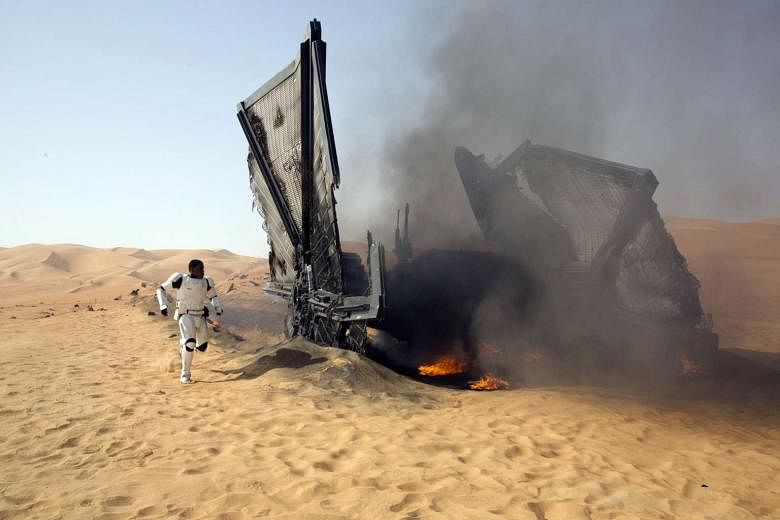LOS ANGELES (BLOOMBERG) - It appears the force is no longer strong at the box office. As it approaches the end of its remarkable run in theatres, ticket sales for Star Wars: The Force Awakens are fading fast. If past blockbuster patterns are any guide, the film will fall well short of the all-time box office leaders, including Titanic and Avatar.
Once inflation is factored in, it likely won't top the seminal Star Wars film from 1977, either.
Here's how the math breaks down. The Number 1 movie in each of the past 20 years made 93 per cent of its box-office revenue, on average, in its first nine weeks in theatres, according to IMDb's Box Office Mojo. In other words, the latest Star Wars journey just about concluded last weekend.
To date, the film has garnered US$916 million (S$1.28 billion) in US theatres and a total of US$2.03 billion globally. Play the equation out and The Force Awakens projects to top out at about US$2.2 billion.
In January, the numbers suggested that the film could top Avatar's US$2.8 billion global haul.
"I think that (Walt Disney Co.) thought-especially overseas-it would really carry, but it just didn't pan out," said Jeff Bock, senior box office analyst at Exhibitor Relations.
Bock believes the studio somewhat limited its box office haul by playing it safe with the story line. "It was almost an homage to the original trilogy, and that isn't pushing any envelopes with new fans," he said.
There's a chance the film can buck the expected swoon. Hollywood's best offerings (the all-time cinema all-stars) tend to have a little more staying power. After nine weeks, Titanic had collected only about two-thirds of its eventual box office revenue. During this window, Avatar won just 88 per cent of its haul.
But The Force Awakens is already fading badly at the box office. China's moviegoers started tuning out after the first weekend; at this point, China is pretty much over it.
Increased competition is a huge factor; there are simply more movies for people to choose among these days. Last year, Hollywood sent almost 700 films into theatres, one-third more than it did in 2009, when Avatar appeared. In the past two decades, the film industry's output has increased by 69 per cent business to Deadpool, an unexpected blockbuster, along with Kung Fu Panda 3 and The Revenant.
A further issue, according to Bock, is that the film didn't showcase any breakout technology. In 1997, Titanic was a milestone for computer-generated imagery and Avatar introduced vanguard 3D viewing, both big draws globally.
"Those films each offered things you've never seen before on screen," he said. "Star Wars wasn't offering that. It's was like going to Disneyland again."
To be fair, The Force Awakens is a massive success by any metric. Before interest petered out, it smashed through a long list of early box office milestones. In US theatres, it topped the nine-figure mark in just 21 hours.
More important for Disney, the ecosystem of toys and video games (and undoubtedly, theme parks) will push the overall Force Awakens haul to almost US$10 billion. In short, the film is about as disappointing as Darth Vader is cuddly.
But as a movie, it's not in a separate galaxy. At the moment, that doesn't really matter, but it may count three or four movies down the line.
At that point, super-fans fuelled by nostalgia will no longer be going to multiple screenings to parse every detail, and Star Wars newbies might be losing interest.
When it comes to franchise fatigue, the force is always strong.
And Star Wars puns.

